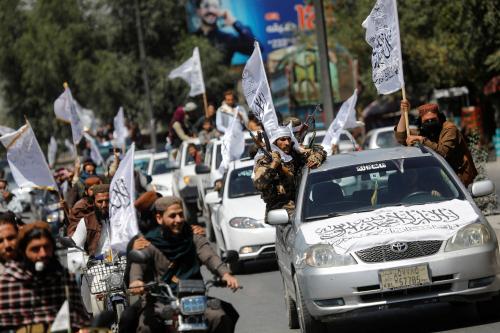Is an imperfect election better than no election?
Afghanistan will find out Oct. 9, when Afghans elect a president, a significant step along the country’s road to national recovery. But Al Qaeda, the Taliban, Afghan warlords and drug barons — and those fighting against them — are causing deep worries among Afghans and the international community that has shepherded Afghanistan’s emergence from 30 years of war. As in other volatile countries plagued by conflict, continuing insecurity in Afghanistan is a risk to the election and may also color the political legitimacy conferred by the voters.
Eighteen candidates, including Hamid Karzai, the interim president, are running. Almost 10 million Afghan citizens have registered to vote, and an appointed commission has set up voting procedures in a country without electoral traditions or opportunities. Although delayed, this presidential election could help fulfill the letter, if not the full spirit, of the 2001 Bonn agreement for an orderly transfer of power in Afghanistan.
But Afghanistan’s wars are jeopardizing election plans. The ethnically polarized candidate list recalls old quarrels more than political promise, and registration irregularities have led disaffected tribes to allege political discrimination. Because the international anti-terrorism coalition still fights along the country’s eastern border and clan warfare erupts intermittently — as it did two weeks ago between warlords Ismail Khan and Amanullah Khan — campaigning has been limited to a few locales. Neither the national army nor police are equipped to prevent most disturbances. (Twenty-four of the country’s 34 provinces have no international security presence at all.) The Taliban is surreptitiously campaigning against the “wicked regime of Karzai,” who, they say in threatening “night letters” to border communities, is a puppet of Westerners in “occupied Afghanistan.”
The most disturbing feature of the electoral landscape is the private militias that dominate politics in the center and north of the country. They could spoil the election through violence or, like the infamous warlord Abdul Rashid Dostum, surrogate presidential contenders.
The law says candidates cannot deal in narcotics, control private armies or have been convicted of human rights abuses. It’s difficult to prove drug trafficking even in a country awash with poppies, and judicial reform has moved so slowly that no courts have heard cases involving alleged human rights offenses, although private reports detailing abuses will soon be released.
But everyone knows where to find militias; they patrol large sections of Kabul. No one doubts that 20 battle-hardened years have cemented the loyalty of Dostum’s men. Like Dostum, two other candidates had to prove to the election commission that their militia associations were over, although it’s hard to know what that proof means. Karzai dropped his warlord running mate, Mohammed Qassim Fahim, from his ticket. But authorities worried that Dostum might disrupt the entire election and so worked a special deal to transfer some of his forces to government control.
This is the heart of Afghanistan’s electoral problem: Bullets and ballots don’t mix, but Afghans will vote within sight of gun barrels. Thirty years of war has left middle-age fighters knowing little else, and Afghanistan’s constitution enshrines freedom fighters as national heroes. But warlords are freedom fighters run amok, and their stranglehold on Afghan society is a kind of war against the state.
The Bonn agreement assumed that soldiers would be disarmed, demobilized and reintegrated into the civilian economy before votes were cast. This has not happened. Programs to disarm and demobilize private armies often fall short in countries where reintegration is nearly impossible. The Afghan economy cannot yet stand on its own, and the security Afghans need — to be free to imagine a life of safety, certainty and opportunity — remains elusive.
Karzai has backed away from his preelection commitment to bring 60,000 fighters into civilian life, and the government’s international partners in this election have not pushed him to fulfill his promise. His 17 opponents aren’t spoiling for this fight either. Some routinely disparage the noxious combination of guns and narcotics that threatens the security and integrity of voting, but none have the power to stand up to warlords. Most are united only against Karzai, whose control of limited state resources reflects, they believe, the inappropriate wishes of donor governments.
These problems led many observers to denigrate the elections or call for their postponement. Karzai has rescheduled technically complicated local, provincial and parliamentary elections for next spring, a risky move that challenges constitutionally guaranteed checks and balances. But he clearly believes a president needs the mandate that elections provide. By running against him, his rivals seem to agree, and so, it appears, do prospective voters.
But what kind of legitimacy is conferred on a leader whose country is split among armed factions that equate authority with the spoils of war?
This question is critical for Afghans and equally important for the governments that support Afghanistan’s recovery. More than new Afghan voters, these governments understand the vital electoral values of equality, equity, inclusiveness and fairness. Their experience in other conflict-prone states should have equipped them to help in the reconciliation of militarism, state-building, transitional justice and democratic development. The fact that international standards for free elections will not be met in the presidential election reflects not only the unfinished partnership between Afghanistan and the international community but also the incomplete political legitimacy vested in the country’s future government.
At best, elections are one step toward democracy. If Afghans can cast ballots without fear of intimidation or retribution, if candidates and voters accept the results, and if war does not break out after polling day, they will probably believe their voices count. In this sense, the election, as imperfect as it will be, will offer Afghans a lens through which to imagine a political future. But if voting is only symbolic, the day after the election, no matter who wins, will be a difficult one.



Commentary
Op-edAfghan Elections: Even if It’s Not Perfect, a Ballot Beats a Bullet
August 29, 2004